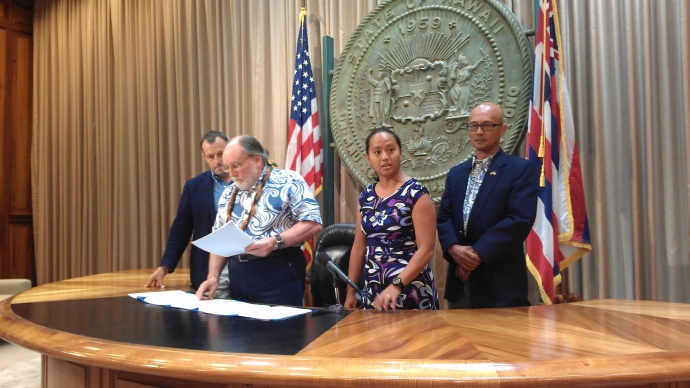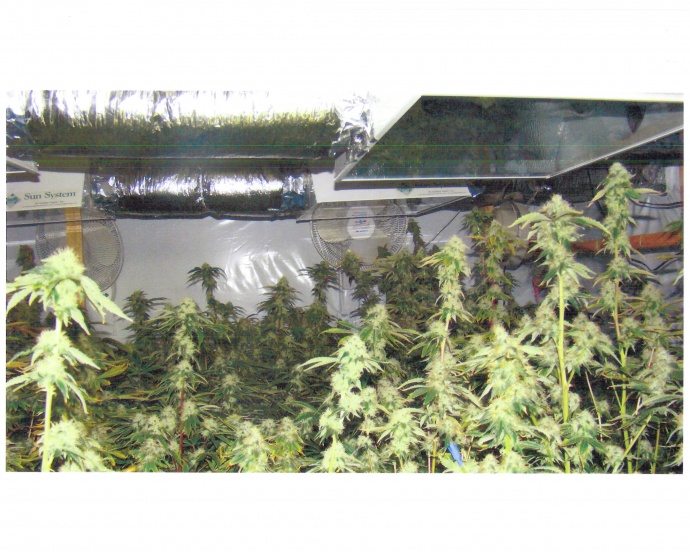Marijuana Advocates Celebrate Enactment of 2 Bills

Senator Josh Green, Governor Abercrombie, Representative Della Au Belatti (speaking), Senator Will Espero. Courtesy photo, ACLU.
By Wendy Osher
Governor Neil Abercrombie today signed two bills into law relating to the administration of medical marijuana.
The news has already drawn support from both the American Civil Liberties Union of Hawaiʻi and the Drug Policy Forum of Hawaiʻi.
House Bill 668 effectively authorizes the transfer of the medical marijuana program from the Department of Public Safety to the Department of Health and establishes a Medical Marijuana Registry special fund.
Senate Bill 642, amends the definitions of “adequate supply,” “medical use,” “primary caregiver,” “usable marijuana,” and “written certification.”
The measure allows the medical use of marijuana if the amount of marijuana possessed by the qualifying patient does not exceed an “adequate supply.” This language effectively adjusts the type and amount of medical marijuana a patient can legally possess, according to advocates of the legislation.
The bill also amends registration requirements and allows inquiries by law enforcement agencies regarding registration status to be made 24 hours a day, 7 days a week. Under SB642, the DOH is required to immediately verify, upon inquiry, whether the subject of an inquiry is registered with DOH.
Both measures take effect in January of 2015.
Health Committee Chair Representative Della Au Belatti issued a statement regarding the newly signed bills saying, “Today’s bills represent a significant step forward in improving Hawaii’s medical marijuana program and aligning it with best practices of medical cannabis programs in other states.”
She continued, “By refocusing the program on medical matters such as the role of the primary physician and the role of the Department of Health in providing regulation and program oversight, the state can better ensure the compassionate treatment of people suffering from debilitating health conditions.”
The ACLU of Hawaiʻi and the Drug Policy Forum of Hawaiʻi issued a joint statement saying the bills improve patient privacy and safe access to medical marijuana.
The groups noted that the two bills are the first updates to pass in the legislature since the program began, with advocates calling the measures a “significant first step to modernize Hawaii’s 13-year-old medical marijuana law.”
The ACLU of Hawaiʻi and the Drug Policy Forum of Hawaiʻi recounted results of a poll conducted locally on 600 Hawaiʻi voters by QMark Research, between November 19 and December 4, 2012. The findings reportedly included the following:
- 81% of Hawaiʻi voters support access to medical marijuana by sick and dying people under a doctor’s care; and
- 78% of Hawaiʻi voters support a dispensary system for medical marijuana.
Pam Lichty, president of the Drug Policy Action Group, said she looks forward to working with lawmakers next year to “establish state-regulated dispensaries, and to make additional patient-centered improvements to the Hawaii program.”
Vanessa Chong, executive director of the ACLU of Hawaiʻi said, “Finally, 13 years down the road, Hawaiʻi is moving toward patient-focused policies and away from a law enforcement approach. These bills do not address every concern, but are the first real steps toward a more sensible public policy,” she said.













